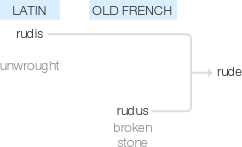Rude
Middle English(in rude (sense 4), also ‘uncultured’): from Old French, from Latin rudis ‘unwrought’ (referring to handicraft), figuratively ‘uncultivated’; related to rudus ‘broken stone’.
wiktionary
From Middle English rude, from Old French rude, ruide, from Latin rudis(“rough, raw, rude, wild, untilled”).
etymonline
rude (adj.)
late 13c., "coarse, rough, without finish" (of surfaces), from Old French ruide (13c.) and directly from Latin rudis "rough, crude, unlearned," a word of uncertain etymology, related to rudus "rubble." The usual preferred derivation is that it is from the same source as Latin rufus "red" (see rufous) via a notion of raw ("red") meat, but de Vaan points out "there is not a shimmer of a meaning 'red' in rudis or in rudus 'rubble', so that the supposed shift from 'crude (meat)' > 'crude' rests in the air."
The senses of "ill-mannered, uncultured, boorish; uneducated, ignorant" are from mid-14c.; also of actions or acts, "violent, rough." That of "of low birth or position, common, humble" is from late 14c. The meaning "marked by incivility, contrary to the requirements of courtesy" is perhaps late 14c., certainly by 16c., but difficult to distinguish from earlier "unrefined, uncultured" senses.
Rude boy (also Rudie, for short) in Jamaican slang is attested from 1967. Figurative phrase rude awakening is attested from 1895.
